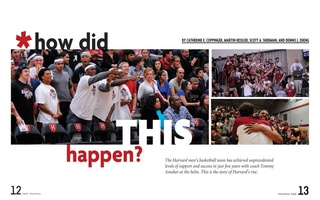UPDATED: February 5, 2013, at 6:08 a.m.
Roughly 70 students, or approximately one percent of Harvard’s undergraduate body, were forced to temporarily withdraw from the College last fall in connection with the massive Government 1310 cheating scandal, Harvard indicated in an announcement Friday morning.
In an email sent to the Harvard community, Dean of the Faculty of Arts and Sciences Michael D. Smith wrote that “somewhat more than half” of the cases heard by the College’s Administrative Board last fall resulted in forced withdrawals. He did not specify exactly how many students were required to leave.
Smith also wrote that about half of the fall’s remaining cases resulted in disciplinary probation, while the rest resulted in no disciplinary action.
About 125 of the cases heard by the Ad Board last fall were those of students implicated in the scandal, which was unearthed after assistant professor Matthew B. Platt reported suspicious similarities on a handful of take-home exams in his spring course Government 1310: “Introduction to Congress.”
After this initial tip-off, the College launched an investigation that eventually expanded to involve almost half of the 279 students enrolled in the course.
Smith also revealed details about how tuition payments will be calculated for students who were required to withdraw mid-fall semester due to their involvement in the scandal.
Due to a prolonged time frame for the resolution of the cases stretching from late September to December that “had an undesirable interaction with our established schedule for tuition refunds,” the College will adjust tuition charges for all students who eventually withdrew as though they were issued their verdicts on Sept. 30, he wrote.
According to the student handbook, a student who involuntarily or voluntarily withdraws from the College on Sept. 30 must pay $4,697 in tuition, as well as per diem room charges, pro-rated board costs, and a student services fee.
Smith’s email, which represents Harvard’s first substantive announcement about the investigation’s status since it was first announced last August, comes in the midst of harsh criticism of Harvard’s handling of the case from several longtime Harvard insiders.
Former Dean of the College Harry R. Lewis ’68 voiced his disapproval in several blog posts, and prominent men’s basketball supporter and Staples founder Thomas G. Stemberg ’71 excoriated his alma mater for its response to the scandal in a letter of complaint sent to University President Drew G. Faust last month.
Smith’s email repeatedly alluded to these and other criticisms, at times striking a defensive tone in addressing the amount of time the University took to resolve the cases, concerns about faculty teaching, and the public outing of some accused students.
After both Lewis and Stemberg criticized Harvard for failing to hand out verdicts in a timely manner, Smith attributed the slow turnover of the investigation—which began in the summer but did not wrap up until early December—to “the unprecedented number and complexity of cases.”
Critics of the investigation have also drawn attention to the way Platt organized Government 1310, a factor which both Stemberg and Lewis blamed for the unprecedented scope of the scandal.
“We had a professor who, like many the Faculty of Arts and Sciences assigns to teach undergraduates, was clearly not qualified to do so,” Stemberg wrote in his letter to Faust, which was dated Jan. 6.
Read more in College News
Few Hit Jackpot In Course LotteriesRecommended Articles
-
 The Rise of Harvard Basketball
The Rise of Harvard Basketball -
Faust Nominated to Staples Board of DirectorsUniversity President Drew G. Faust has been nominated to serve on the Board of Directors of office supply store chain Staples, the company announced this week.
-
 Ivy Players, Alums React to News of Casey and Curry
Ivy Players, Alums React to News of Casey and Curry -
Alumnus Slams Harvard's Handling of the Cheating ScandalThomas G. Stemberg ’71, founder of the retail chain Staples and a prominent supporter of the Harvard mens’ basketball program, characterized the College’s handling of the Government 1310 cheating scandal as “Orwellian” in a personal letter addressed to University President Drew G. Faust.
-
Text of Stemberg's Letter Addressing the Cheating ScandalRead the text of a personal letter obtained by The Crimson this week that was sent by prominent alumnus Thomas G. Stemberg ’71 to University President Drew G. Faust.
-
Letter to the EditorStemberg’s letter loses credibility for its lack of proper access to crucial information, making his blanket statements about right and wrong forms of cheating all the more inappropriate.













